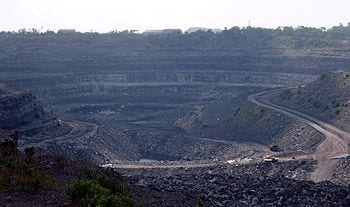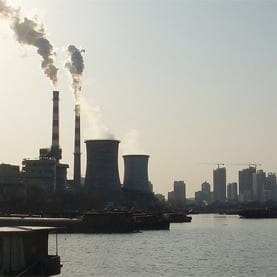
A cheap, ubiquitous and flexible fuel, with just one problem
WHAT more could one want? It is cheap and simple to extract, ship and burn. It is abundant: proven reserves amount to 109 years of current consumption, reckons BP, a British energy giant. They are mostly in politically stable places. There is a wide choice of dependable sellers, such as BHP Billiton (Anglo-Australian), Glencore (Anglo-Swiss), Peabody Energy and Arch Coal (both American).
Other fuels are beset by state interference and cartels, but in this industry consumers—in heating, power generation and metallurgy—are firmly in charge, keeping prices low. Just as this wonder-fuel once powered the industrial revolution, it now offers the best chance for poor countries wanting to get rich.
Such arguments are the basis of a new PR campaign launched by Peabody, the world’s largest private coal company (which unlike some rivals is profitable, thanks to its low-cost Australian mines). And coal would indeed be a boon, were it not for one small problem: it is devastatingly dirty. Mining, transport, storage and burning are fraught with mess, as well as danger. Deep mines put workers in intolerably filthy and dangerous conditions. But opencast mining, now the source of much of the world’s coal, rips away topsoil and gobbles water. Transporting coal brings a host of environmental problems.
The increased emissions of carbon dioxide from soaring coal consumption threaten to fry the planet, as the Intergovernmental Panel on Climate Change reminded everyone in a new report this week (see article). The CO2makes the oceans acid; burning coal also produces sulphur dioxide, which makes buildings crumble and lungs sting, and other toxic chemicals. By some counts, coal-fired power stations emit more radioactivity than nuclear ones. They release tiny, lethal particulates. Per unit generated, coal-fired stations cause far more deaths than nuclear ones, and more even than oil-fired ones.
But poverty kills people too, and slow growth can cost politicians their jobs. Two decades of environmental worries are proving only a marginal constraint on the global coal industry. Some are trying to get out: in America Consol Energy is selling five mines in West Virginia to concentrate on shale gas. Big coal-burners such as American Electric Power and Duke Energy are shutting coal-fired plants. Yet despite America’s shale-gas boom, the federal Energy Information Administration reckons that by 2040 the country will still be generating 22% of its electricity from coal (compared with 26% now). The International Energy Agency has even predicted that, barring policy changes, coal may rival oil in importance by 2017. As countries get richer they tend to look for alternatives—China is scrambling to curb its rising consumption. But others, such as India and Africa, are set to take up the slack
The Latest on: Coal
[google_news title=”” keyword=”Coal” num_posts=”10″ blurb_length=”0″ show_thumb=”left”]
via Google News
The Latest on: Coal
- Coal India share price Today Live Updates : Coal India Stock Rises on Positive Trading Dayon May 3, 2024 at 9:45 am
Coal India stock price went up today, 03 May 2024, by 0.93 %. The stock closed at 453.25 per share. The stock is currently trading at 457.45 per share. Investors should monitor Coal India stock price ...
- The big banks still backing coalon May 3, 2024 at 4:01 am
Some of the biggest coal financiers have cut down over the past eight years. JPMorgan Chase was the third-biggest US bank financier for coal businesses last year, with total financing of $1.8bn, ...
- EPA power plant rule targets coal. Does that spell trouble for the grid?on May 3, 2024 at 3:59 am
Piles of coal parked at the entrance of Baltimore Harbor are the gateway to one of the biggest fossil fuel plants in the mid-Atlantic region. After years of public debate and litigation brought by the ...
- Illinois passed a law to clean up coal ash 5 years ago. What’s taking so long?on May 3, 2024 at 1:30 am
Illinois passed landmark legislation five years ago to remove coal ash from ponds and other sources. What's taking so long?
- Australia’s No. 2 Pension Fund to Curb Thermal Coal Investmentson May 2, 2024 at 3:15 pm
Australian Retirement Trust, the country’s second largest pension fund, plans to stop directly investing in most thermal coal companies as it targets net zero across its portfolio.
- Coal India beats revenue estimates as higher volumes offset fall in priceson May 2, 2024 at 11:37 am
Coal India reported a better-than-expected fourth-quarter revenue on Thursday, as higher sales volumes at its pits offset a fall in prices.
- New US climate rules for pollution cuts ‘probably terminal’ for coal-fired plantson May 2, 2024 at 2:52 am
Experts say only ‘handful of plants’ operating with the dirtiest fuel will likely survive, and only Trump and lawsuits could save them ...
- EPA rules that limit pollution from coal-burning power plants are long overdueon May 2, 2024 at 1:30 am
The EPA estimates that the new rule will reduce these pollutants by about 670 million pounds per year. Coal plant owners will have until 2029 to comply, unless they agree to permanently stop burning ...
- The emissions and trade flows impact of the G7 coal pledgeon May 1, 2024 at 12:29 pm
The energy ministers of the Group of Seven (G7) major democracies vowed this week to end coal use in power generation within around a decade, marking a further high-profile pledge to accelerate the ...
- Coal Is Proving to Be a Tough Habit to Kickon May 1, 2024 at 4:48 am
Glencore Plc’s biggest investors are willing to overlook the mineral’s role in climate change when they see the profit it generates.
via Bing News










